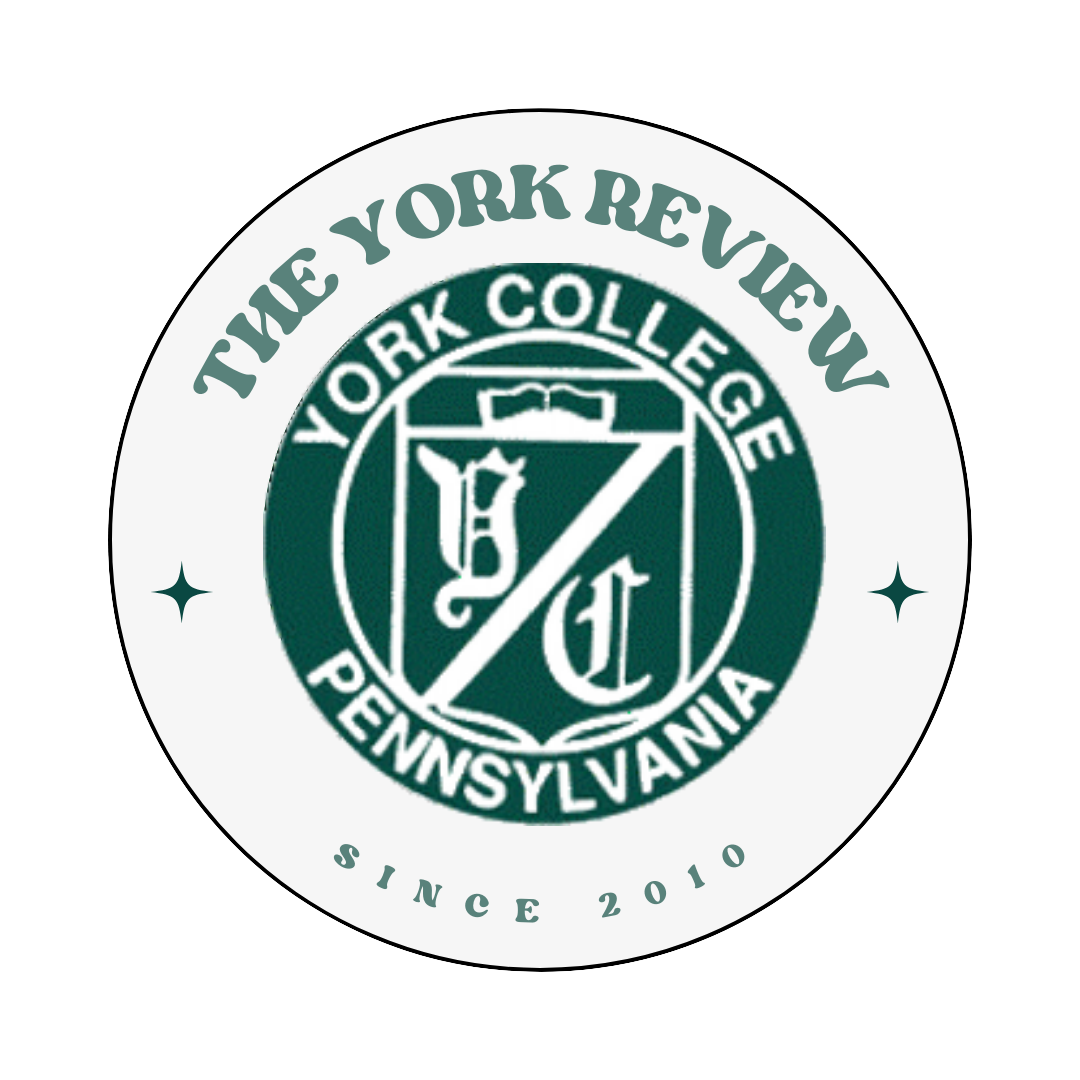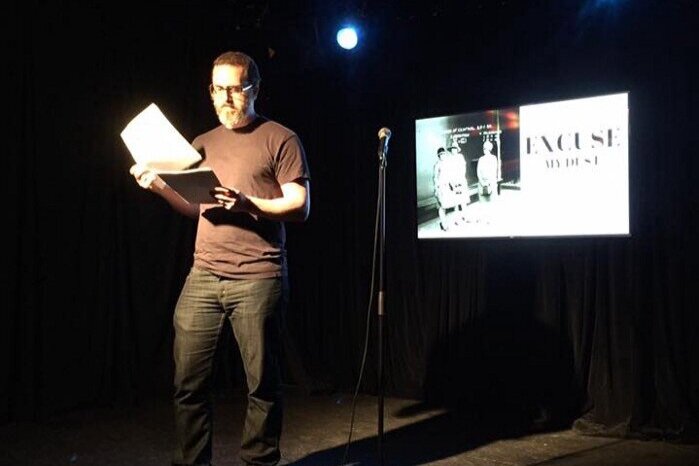Where Are They Now? Featuring: Michael B. Tager
We’re interviewing alumni who graduated from York College of Pennsylvania to see “where they are now.” Today’s interview is with Michael B. Tager, a graduate from 2002 that has since become a professional writer and editor, publishing a variety of creative and nonfiction pieces. Currently, he works in multiple positions within the field, including managing editor, book reviews editor, freelance writer, and freelance editor. He currently lives with his wife in Baltimore, Maryland.
How would you describe your experience at York College of Pennsylvania as an undergraduate student? Do you have any pieces of advice that may be valuable to current college students — specifically writing students?
My experience was probably pretty typical in a lot of ways. For one, I didn’t actually want to be in college when I attended YCP (from ’98-‘02), but not because I had anything against college. I just had no idea what I wanted to do and I certainly didn’t have any study skills or an idea of how to apply myself. So, while I did attend class, homework wasn’t exactly my thing and my grades were nothing to brag about. I did find myself involved in a lot of extra curricular: plays, swimming, the York Review, some intramural sports, speech. So, in a traditional sense of college being about trying on different outfits and different ideas until I found one that fit: success. In a grade-average-internship-transition to working job: big swing and miss.
As for writing, well, I wrote one story in college that I completed, which was published in the York Review. I was digging around my personal archives and shucks, no luck. I think it was ’00 or ’01. But regardless, it’s notable that I finished one story (and a play that got 3rd place in the Bob Hoffman prize over there), because I thought of myself as a writer but didn’t have anything to say. I made a conscious choice once I graduated to kind of put my writing away until I experienced life a little. Which I did. Between ’02 when I stopped writing and ’10 when I took it up again after going back to school for a second undergrad, I did a lot, read a lot, worked and traveled a lot. I had developed much more of a sense of what I was interested in.
In other words, don’t force it.
You’ve published a variety of works — fiction, poetry, creative nonfiction, and nonfiction — throughout the course of your writing career thus far. That being said, what is your favorite type of genre to write in and why?
I used to say I was a fiction writer who wrote in other genres. I’m starting to think that writing is writing, regardless of the genre. It’s all craft and knowing your audience and adjusting the style to the purpose of the piece. Basically, I’ve taken too many rhetoric classes. But regardless, to be more clear: fiction is certainly my first love and I probably work on it the most often. Poetry I quite enjoy, but it’s certainly not my main focus (though I almost have a manuscript ready to send out for publication there, too.)
Straight journalism is certainly my least favorite. But that’s the one that actually pays, so there’s pluses and minuses to everything!
Presently, you’re the managing editor of both Writers and Words and Mason Jar Press and the book reviews editor for Atticus Review. What are the primary differences between these individual positions, and how have they impacted your overall writing and editing abilities thus far?
Well, I actually recently stepped away from Writers and Words. It’s a lot of work running a monthly reading series and creating an individual zine every month. It doesn’t sound like it, but it is. I’d been doing it for 3 years and have a super amazing team and it was time. But for both it and Mason Jar — which is the independent press I co-run — my job was really similar. Organization and small details aren’t always the common denominator in artists, and due to my day job in research, I have learned those skills. I coordinate a lot with authors, with venues, with printers. I’m putting together the meetings, making sure tasks are assigned, tracking money, sending out queries, and lining up talent. “Managing Editor” is not the sexiest title, but shit not getting done drives me crazy. I like enabling art to be created, even if my work is kind of aslant from it.
For Atticus Review it’s a lot more streamlined. Atticus Review is a dope literary magazine and I just run one small section. I’m the book reviews editor and I spend a lot of time requesting books from independent presses, reading pitches from agents/publicists/authors on their books and then assigning them to my stable of authors. When they send in their reviews, I edit them and suggest notes/places to expand. It’s fun. I like editing and I like promoting authors. Kind of a win-win.
In addition to the three aforementioned positions, you are also self-employed as a freelance editor and writer. Based on your experience, what advice would you give those who are interested in freelancing?
Freelance writing and editing is a tough racket. I’m super privileged in that I have a full-time job and a wife who also works, so I’m able to pick and choose what or if I freelance. I have friends who do it full-time and it’s a hustle. They’re not living paycheck-to-paycheck, but they’re also not living large, yet. It’s a bit of a grind for them. But early on, if you want to freelance, you have to say yes to everything and pitch constantly, to websites and journals and local magazines. And get used to rejections until you have a portfolio. I’m starting to get to the place where I can start to say no. Which is nice.
Writing and editing aside, what are some of your other interests? In the event that you manage to have some free time in the midst of your work, what do you like to do in Baltimore? Do you have any recommendations?
I’d actually have more free time if I didn’t enjoy the writing gig so much. I want to keep on going. BUT, to answer your question better…I dunno. I watch movies and play video games. I work out a lot. My wife and I travel as much as we can. I DJ once in awhile at a couple clubs in Baltimore, which is cool. I’m never not with a book. Plus the Orioles and parks and stuff. And besides writing events, there’s a ton of independent, avant-garde theater, music (hip hop and metal especially), and art shows in the city. If I wanted to, I could go to something artist-related every night. I really, really don’t want to, but the option is there. With the Maryland Institute College of Art (MICA) and 4 MFA programs in writing in the city, we’re deluged with art. Which is pretty rad. But if you’re into art, Baltimore is oddly enough the city for you.
Recently, you returned to York College of Pennsylvania. Could you please tell us a little bit about your experience there? What did you do, and how has the environment of the college changed since your 2002 graduation?
Coming back to York was great. I was there to pop into a literary publishing class and talk about my experiences and then give a poetry reading. Great class, great crowd. It’s nice to come back to a place where I had 4 formative years as an adult with a product I’m proud of. Even if the context is a little… odd? Nostalgic? I’m not sure of the word or the emotion. Maybe it’ll come to me.
But I came back a year or two after I graduated for a swimming reunion and checked out the “new” athletic center. It was surreal and I was kind of pissy since the gym when I was there was, um, less good. But that was a small taste of the changes. Because when I was there on 10/25, it felt like half the campus had changed. I mean, I looked at the cinder block of Manor North and THAT looked the same, but the new Humanities building blew my mind (especially since it was where the swimming pool had been). Campbell Hall was all changed up, that Spart’s Den was all funky, the theater where I’d performed Rosencrantz and Guildenstern Are Dead and The Importance of Being Earnest wasn’t what it used to be. I mean, that’s how time works, in linear progression and decay/renewal, but it still wigged me out. Which is fine. Totally fine. I’m not crying, you’re crying.
For more information about Michael B. Tager, visit his official website: http://www.michaelbtager.com/

